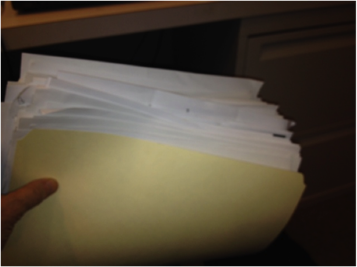Ever wonder where the test creators get the material on which to ask questions for those high-stakes standardized tests? A typical question consists of three paragraphs of, usually, nonfiction prose that the test-taker reads for meaning and then responds to questions by filling in bubbles for electronic scoring. I can assure you that the companies who create tests don't write the writing samples. Instead, they scour children's nonfiction literature and ask authors like me for the rights to excerpt our books. How do I know? I have a two-inch-thick folder of permissions I've granted over the years.
Interestingly, my books are seldom the required classroom reading material. Content in disciplines like science and social studies is "gone over" from textbooks where the writing is flat at best and insulting to the reader at worst. On the tests, the kids are asked to figure out, for example, "what is the author's point of view?" How are they supposed to do that if they have only been exposed to politically correct material formulated by committee where there is no author pov?
Recently I received an email from a "passage writer" at the Center for Educational Testing and Evaluation (CETE) in Lawrence, Kan., offering me $500 to write passages for the assessment tests. There were two attachments: "Tips for Writing Topics" and "Writing Guidelines." Here are a few excerpts:
"When coming up with topic ideas for reading passages, it's always best to go with something familiar to you. Choose topics in which you have prior knowledge or interest. This will make the passage easier to write, and will often reflect in the writing. Because writers may use a maximum of 5 sources when writing a passage, choosing passages in your realm of knowledge will also minimize the number of sources you have to rely on."
"Keep in mind that passages may not have references to drugs, sex, alcohol, gambling, magic, holidays, religion, violence, or evolution, and that topic ideas should not lend themselves to passages which would require such content."
"Use grade-appropriate vocabulary. To check your passage, use Microsoft Flesch-Kincaid Grade Level readability test (part of Microsoft Word programs)."
Clearly the authors of these documents didn't know who they were writing for. Did they think that after 90 books I need their tips? Do they have any idea how these "tips" flatten text and clip the wings of a talented writer? Is it their intention that the CCSS teach kids how to read bad writing? Don't they know that kids build vocabulary by being exposed to literature and spoken language where nuanced words are used in context, not through leveled readers with controlled vocabularies? And if you think kids can't learn multi-syllabic words, just talk to a 5-year-old expert on dinosaurs.
Another problem is that high-stakes testing produces an answer-driven culture in schools where getting the right answer becomes all-important. What happens when you give an answer? The inquiry stops.
Socrates gave us the key to powerful education more than 2,000 years ago. Questions, challenging questions, should drive learning. Creativity in science, history, journalism, and math comes from asking insightful questions. I love to tell kids the story of Isador Isaac Rabi (1898-1988) who won the Nobel Prize in Physics in 1944 for his discovery of magnetic resonance. He claimed he owed his success in science to his mother. Every day, when he came home from school she would ask him, "What good question did you ask today?" So I'm going to give you a few good questions for you to ask in assessing the learning of your children and the effectiveness of your schools:
Here's a question I've been asking my grandchildren and other school-age kids: Who among your teachers do you think is having fun teaching you? By "fun," I mean that you can tell that the teacher wants to be in the room with you, is engaged in the subject and cares that you are also engaged.
My grandson, Jonny, had to think a long time before he came up with his sixth grade Language Arts teacher. (He was in seventh grade at the time.) A tenth grader could only think of his young technology teacher. When I asked him why he accepted this status quo, he shrugged and said, "It is what it is." He goes to a highly rated high school in an upscale neighborhood.
A follow-up to this question is: How do you know that a teacher isn't having any fun teaching you? Jonny had an instant reply to this one: "Because I'm not learning very much."
Here's a question for teachers: What would it take for you to be the teacher you always dreamed of being? Their answers may be a better assessment than the "value-added" measures attached to student scores.
Not to ignore administrators: How can you expect teachers to teach critical thinking if they are not allowed to ask challenging questions about executing their jobs in a school system?
And while we're at it, here's one for the test creators: Since you're using our work as the basis for your tests, why don't you let us children's nonfiction authors take them?We should be able to ace them with flying colors, right? What would it mean if we flunked? I have absolutely no way of knowing how I'd do.
I'm just asking........
